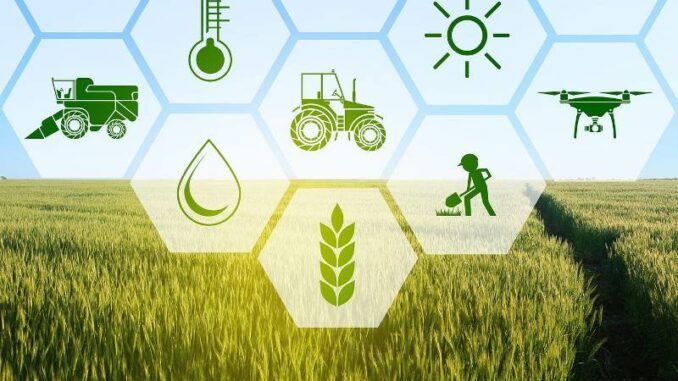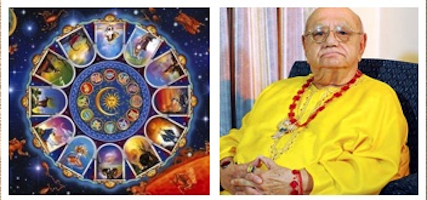
“Artificial Intelligence’ can help increase crop yields and optimize resource usage through precision agriculture. AI-powered systems can analyze data from sensors, satellites, and drones to provide insights into soil health, water usage, and crop growth. This information can then be used to make data-driven decisions about irrigation, fertilization, and pest control, resulting in higher crop yields and lower environmental impact. AI can also be used to develop new crop varieties and predict weather patterns, helping farmers to be more resilient to climate change. AI-powered cameras, drones, smart fences, and plant sensors help in detecting cattle intruders and pest invaders. AI can analyze historical data and weather forecasts to predict potential infestations and optimize crop protection measures. AI-powered sprayers can target specific areas with pesticides and fertilizers, reducing waste and improving efficacy.”
‘Decentralize Farming with Blockchain’ is a recent social media advertisement further stating, ‘Revolutionize Food with Blockchain.’ It sounded more like an educational course.

My interest in agriculture comes from my birth country, India, where agriculture is a large sector of the economy and constantly suffers. During my recent visit to India, I had the chance to interact with horticulture and plant health management institutions. Both these institutions are working towards the mission of empowering the farmers. As we all know, social media is keeping an eye on me and my activities to send these well-curated ads on my way. I was curious about the course and started exploring how a resource incentive, modern Blockchain, can help ever challenging and traditional agriculture.
Secondly, how can these high-end technologies help mostly uneducated farmers? How are these technologies going to shape the future of agriculture? Do they propose a reliable framework? Do these frameworks help produce high-impact organic food with low-cost Agri-inputs? What are the dichotomies of opportunities and challenges of these technologies? Can they ever be institutionalized? With these questions in mind, I dive deep into the concept and how these technologies can be integrated into agriculture.
Unison of Technologies
In the new era of farming, how these technologies collaborate for smart agriculture is seamless. IoT is a network of interconnected devices that can collect and exchange data. At the same time, AI is a set of technologies that can analyze and learn from data to make decisions and predictions. Finally, Blockchain is a decentralized and secure ledger that records and verifies transactions. When these technologies are combined, they can create powerful and innovative solutions for various industries, including agriculture.
‘Predictive Agriculture’ is possible with these technologies that help in yield prediction, resource optimization, disease, and pest detection, risk management, and supply chain optimization. It is a data-driven approach to farming that uses advanced analytics, machine learning, and artificial intelligence. It involves collecting and analyzing data from various sources, such as IoT sensors, weather forecasts, and historical crop data, to make data-driven decisions and improve farm productivity and sustainability.
The Advantages
‘Internet of Things’, in the sense that more things are connected to the internet than people. If the world’s human population is 8.1 billion, 19.08 billion are connected to the Internet, making the number of connected devices per person 2.35 devices. Agriculture has always been an essential part of human civilization, and with the world’s population projected to reach 9.7 billion by 2050, the need for efficient and sustainable farming practices has never been more urgent. IoT sensors can collect farm data, such as soil moisture, temperature, and crop health. AI can analyze this data to provide insights and predictions, such as when to water or fertilize crops. Blockchain can then securely record and verify these transactions, ensuring transparency and accountability.
‘Blockchain’ technology has the potential to revolutionize the food supply chain by providing precise traceability, streamlined efficiency, enhanced security, improved collaboration, and sustainable transparency. It can promote sustainability in the food supply chain by tracking and reporting environmental impact data, such as water usage, energy consumption, and carbon emissions. Blockchain’s immutable ledger can record and provide a verifiable chain of custody for food products, capturing critical data such as origin, storage conditions, and quality inspections. The smart contracts on the Blockchain can automate and optimize various supply chain processes, including invoicing, logistics, and compliance, resulting in increased efficiency. The cryptographic security features of Blockchain ensure data integrity and prevent unauthorized access, providing a tamper-proof and auditable record of the food supply chain. Moreover, Blockchain’s shared and transparent platform fosters collaboration and communication among all parties in the food supply chain, including farmers, distributors, retailers, and consumers.
‘Artificial Intelligence’ can help increase crop yields and optimize resource usage through precision agriculture. AI-powered systems can analyze data from sensors, satellites, and drones to provide insights into soil health, water usage, and crop growth. This information can then be used to make data-driven decisions about irrigation, fertilization, and pest control, resulting in higher crop yields and lower environmental impact. AI can also be used to develop new crop varieties and predict weather patterns, helping farmers to be more resilient to climate change. AI-powered cameras, drones, smart fences, and plant sensors help in detecting cattle intruders and pest invaders. AI can analyze historical data and weather forecasts to predict potential infestations and optimize crop protection measures. AI-powered sprayers can target specific areas with pesticides and fertilizers, reducing waste and improving efficacy.
The Real Challenge
The real challenge is to do this work in real time and make farmers understand and learn these technologies. Moving these technologies from theoretical framework to application framework. It requires conducting awareness campaigns first and then educational campaigns. Granting subsidies for using technology has proven to be the highest incentive. There is also the argument that a one-time or short-term subsidy can create awareness, help with the evaluation process—learning by doing—and provide information about the technology, thereby accelerating early adoption and the diffusion process.
The integration of IoT, Blockchain, and AI technologies in agriculture presents both opportunities and challenges. While these technologies can increase efficiency, improve data management, enhance transparency, promote sustainable agriculture, and improve food safety, they can also create security risks, interoperability issues, complexity, regulatory challenges, and ethical and social implications. Therefore, it is essential to carefully consider these opportunities and challenges and develop strategies to address them to ensure the successful adoption and scalability of these solutions in agriculture.
(Vijay Nadella is a techie with masters in MBA finance and Project Management and has worked extensively on Enterprise Resource Planning and Business Intelligence Systems. As a technical expert, she has delivered several technical documents for the client organizations with end-to-end solutions. Political and social activist, she is passionate about social upliftment and women’s empowerment. She can be reached at vsn0208@yahoo.com)





Be the first to comment